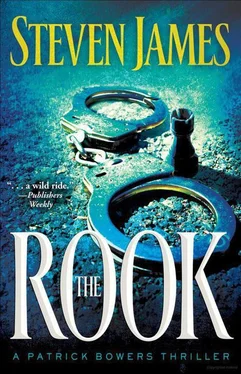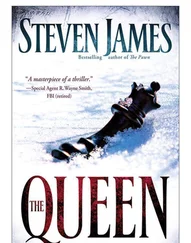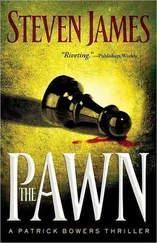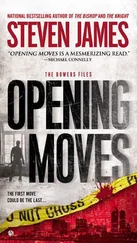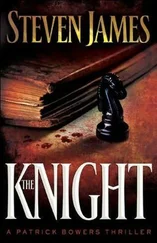Steven James - The Rook
Здесь есть возможность читать онлайн «Steven James - The Rook» весь текст электронной книги совершенно бесплатно (целиком полную версию без сокращений). В некоторых случаях можно слушать аудио, скачать через торрент в формате fb2 и присутствует краткое содержание. Жанр: Полицейский детектив, на английском языке. Описание произведения, (предисловие) а так же отзывы посетителей доступны на портале библиотеки ЛибКат.
- Название:The Rook
- Автор:
- Жанр:
- Год:неизвестен
- ISBN:нет данных
- Рейтинг книги:3 / 5. Голосов: 1
-
Избранное:Добавить в избранное
- Отзывы:
-
Ваша оценка:
- 60
- 1
- 2
- 3
- 4
- 5
The Rook: краткое содержание, описание и аннотация
Предлагаем к чтению аннотацию, описание, краткое содержание или предисловие (зависит от того, что написал сам автор книги «The Rook»). Если вы не нашли необходимую информацию о книге — напишите в комментариях, мы постараемся отыскать её.
The Rook — читать онлайн бесплатно полную книгу (весь текст) целиком
Ниже представлен текст книги, разбитый по страницам. Система сохранения места последней прочитанной страницы, позволяет с удобством читать онлайн бесплатно книгу «The Rook», без необходимости каждый раз заново искать на чём Вы остановились. Поставьте закладку, и сможете в любой момент перейти на страницу, на которой закончили чтение.
Интервал:
Закладка:
But make it quick, then get back to planning the week.
“OK. Let’s see, where to start… So, crimes only occur when five factors intersect.”
“Time, location, offender, victim or object of desire, and lack of supervision or law enforcement presence. That was in the introduction to Understanding Crime and Space. I hadn’t fallen asleep yet.”
“Well, that’s encouraging.” I grabbed a saltshaker and slid it in front of me. It would be too complex to talk through all fourteen fires, but I could at least give her an idea of what I do by referencing four or five of them. “So then, with these arsons, let’s say this is the site of the first fire…” I tapped the saltshaker, then moved the pepper to the far side of the table. “The next arson was down here, south of San Diego in Chula Vista…” I put the rental car keys behind my salad bowl. “And the third fire was here, in Clairemont…” I moved the coffee creamer and the teacup into position.
“And these are fires four and five, what does that tell you?”
“Nothing. They’re just spread out all over.”
“Actually, it tells us several things.” I crumpled up a napkin and set it in the middle of the table.
“Is that the next fire?”
“No, it’s where I believe the arsonist might live. Think about this for a minute: if you started those fires, do you think you’d be familiar with the area?”
“I guess. So I’d know how to get away.”
“Right. But if you committed the crimes too close to your home, you might draw too much attention to yourself.” I dipped my finger in the bread oil and drew two concentric circles around the napkin, the outer one enclosing the salt and pepper fires. As I did so, our server approached, took one look at me finger-painting on the table, spun on his heels, and returned to the kitchen.
“So,” I continued, “you end up with a range, the ideal range, a comfort zone, in between these circles. Far, but not too far. Close, but not too close.”
She put my knife in the range, but on the other side of the table from the pepper. “Like the next fire might be here?”
“Right. Maybe. But I study what’s been done, not what might happen.”
“Does it change? This comfort zone thing? As you get more and more fires?”
“Yes. Because the arsonist isn’t going to keep setting fires in an area where there would be heightened law enforcement activity.
So I ask myself, ‘What’s the significance of these locations to our offender?’ I look at the location, timing, and progression of the fires, compare that to the comfort zone, and then work backward to try and find the most likely location for the offender’s home base-which might be where he lives or maybe where he works.
We call it the hot zone.”
“Sounds simple.”
“In principle, yes. But you need to take into account all of the locations associated with the fires, as well as pathways to and from the scenes. There are a lot of mathematical formulas involved, algorithms based on travel theory, cognitive mapping, stuff like that.”
“They call it a geographic profile, right?”
“Yes.” I took a small bite of salad. “But it’s not like a behavioral profile. Nothing like that.”
“Yeah, you told me that before.”
“Anyway, all the locations, right? So, where he bought the accelerants, where the fires occurred, which fire alarms were set off first, the location of the person calling 911, sight lines.” As I said the words sight lines, I glanced at the table and noticed something.
“Hang on.” I moved my large salad bowl just to the left of the comfort zone. “Can you see the salad fork from there?”
She shook her head.
“What about the keys?”
She shook her head again. “The bowl is in the way.”
Hmm. Yes.
“The bowl is in the way,” I repeated softly.
“What’s the bowl?” she asked.
I inspected the table, moved a few condiments around. “I think it might be Petco Park. Where the Padres play.”
“Bark Park.”
“Right.” I looked at the relationship of the salad bowl to the teacup and coffee creamer.
Yes, yes. You’ll need to look into that.
“What is it?” she asked.
Wait, Pat. Be here right now. Not somewhere else.
“Nothing.” I shook the thought loose. I could come back to it later, after she was in bed. “Anyway, when I compare all those factors to the traffic patterns at the time of the crime, the layout of the roads, bridges, bodies of water, demographics, population distribution, I can begin to… well, you get the idea. Most investigators ask,
‘Why did this happen?’ or ‘What was the offender thinking?’ or
‘How could anyone do such a thing?’ But I ask, ‘When was the offender here?’ ‘Where did he go?’ and ‘Where is he now?’ That’s environmental criminology in a nutshell.”
She studied the table. Looked at the salt and pepper shakers, the keys, the salad bowl, the circle of oil, the coffee creamer. “And you got a doctorate in this?”
“Well, yes, I-”
“How many years of school was that again?”
“OK. So, the aquarium. Sharks. I heard the Sherrod Aquarium has more than a dozen different species-”
“So, you don’t look for motive?”
If only more investigators were as persistent as she was. I tapped my finger against the table. “Not so much. No.”
“Why not?”
“Trying to guess someone’s motives always ends up being nothing more than speculation, Tessa. It’s based on inference rather than deduction, on intuition rather than evidence, and there’s no way to confirm or to refute your guesswork. I’m an investigator, not a mind reader.”
“What does Agent Jiang think of that? It’s a sore spot, isn’t it?
Between the two of you?”
This conversation was going farther and farther astray. “We hold each other in high regard.”
“So I’ve noticed,” she said under her breath.
“What’s that supposed to mean?”
“Nothing.” She took one final gulp of her root beer. “So, can you tell where the next fire is gonna be?”
I shook my head. “No. Like I mentioned before, I work backward to try and find the home base of the offender. I don’t do so well with predicting the future.”
“But try. I mean, if you were going to.”
“I can’t predict the future, Tessa.”
“OK.” She flew her eyes to the other side of the room. “Whatever.”
“You can pout all you like, it’s not going to help me predict the future.”
“Fine. Whatever. I’m not pouting.”
Still no eye contact.
Then she added quiet, nonchalant humming.
Wonderful.
OK. Fine. I studied the table, moved a few more objects around to represent the different fires so far. If I were going to predict the next fire, where would it be? I leaned over the empty salad bowl and checked the sight lines, then used my dessert fork to verify the distances between the fire sites represented on the table.
A few ideas. Nothing solid.
She watched me playing with the silverware and seasonings. “A doctorate, huh?”
“Listen.” I took the napkin and wiped the oil off the table. “Do you want any dessert?”
She seemed to be considering it when one of the servers paused beside her and lowered a platter of the pork tenderloin with mango and pineapple sauce onto the table next to us.
Tessa grimaced. “Ew, that is so disgusting.” I noticed that she pulled back one of the rubber bands she wore around her wrist and snapped it against her skin. “The poor pig. You can still see the blood.”
Slaughterhouses.
Yes, you can. You can still see the blood.
“I think I’m gonna be sick.” She stood. “Let’s go.”
“I need to pay,” I said.
Читать дальшеИнтервал:
Закладка:
Похожие книги на «The Rook»
Представляем Вашему вниманию похожие книги на «The Rook» списком для выбора. Мы отобрали схожую по названию и смыслу литературу в надежде предоставить читателям больше вариантов отыскать новые, интересные, ещё непрочитанные произведения.
Обсуждение, отзывы о книге «The Rook» и просто собственные мнения читателей. Оставьте ваши комментарии, напишите, что Вы думаете о произведении, его смысле или главных героях. Укажите что конкретно понравилось, а что нет, и почему Вы так считаете.
